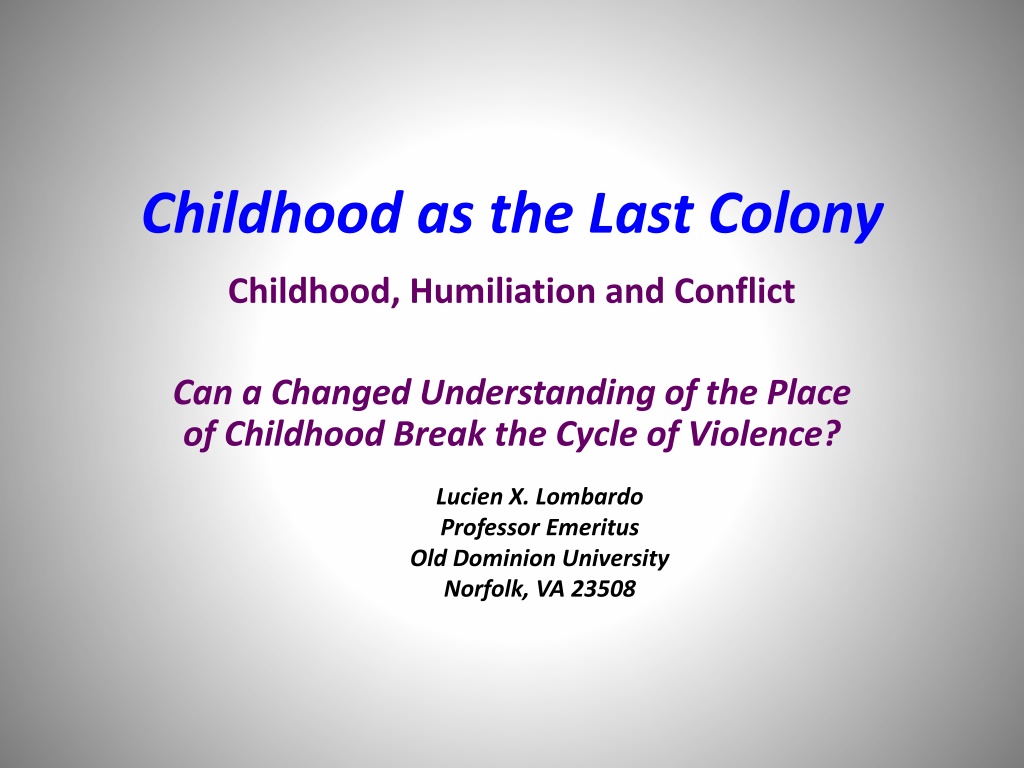Redefining Childhood: Breaking the Cycle of Violence through Human Dignity
The discussion delves into the concept of childhood as the last colony, exploring the dynamics of power, control, and respect in adult-child relationships. It questions how a revised understanding of childhood can potentially disrupt the cycle of violence rooted in humiliation and conflict. Through examining the principles of adultism and child-centeredness, the narrative navigates the themes of human dignity, authenticity, and mutual respect. By challenging traditional paradigms, the narrative advocates for empowering children and recognizing their inherent dignity.
Download Presentation

Please find below an Image/Link to download the presentation.
The content on the website is provided AS IS for your information and personal use only. It may not be sold, licensed, or shared on other websites without obtaining consent from the author. Download presentation by click this link. If you encounter any issues during the download, it is possible that the publisher has removed the file from their server.
E N D
Presentation Transcript
Childhood as the Last Colony Childhood, Humiliation and Conflict Can a Changed Understanding of the Place of Childhood Break the Cycle of Violence? Lucien X. Lombardo Professor Emeritus Old Dominion University Norfolk, VA 23508
Sources of Human Dignity*: Supports and Violations A Young Girl, a Mother, a Grandfather and a Boat: A Story of Human Dignity INTERNAL HOW WE SEE OURSELVES INTERACTIONAL IN RELATIONSHIPS WITH OTHERS SELF EVALUATIONS Self Pride Self Worth Self Esteem Self Respect Self Value POWER AND CONTROL Involved in Decisions Freedom over Body, Opinions, feelings TREATED WITH Respect, Expressions of Kindness, Fairness, Not Controlled AUTHENTICITY Pride in Own Abilities Who and What You Are Being Able to be Myself Being Comfortable with What and Who I Am CONTRIBUTING Opportunities to help others *Derived from Undergraduate Student responses to the following questions: How would you define human dignity? Describe two examples of when you felt your human dignity was supported as a child? Describe to examples where you felt your human dignity was violated as a child? (Course: Violence in the World of Children )
Colonial* Relationships Between Groups: Socially Destructive** ADULT AS COLONIZER: the group who has the power and can impose their will and create others in his image. CHILDHOOD AS COLONIZED: the group whose identity is submerged and whose authenticity is eliminated and who is placed in the service of the colonizer through the force, threat of force by the colonizer. *Drawing on Albert Memmi, THE COLONIZER AND THE COLONIZED; Franz Fanon, BLACK SKINS, WHITE MASKS; Paulo Friere, PEDAGOGY OF THE OPPRESSED; Alice Miller, FOR YOUR OWN GOOD.; **Comstock and Sanford, SANCTIONS FOR EVIL.: SOURCES OF SOCIAL DESTRUCTIVENESS.
Colonial / Adultism - Child Centeredness and Human Dignity: Reflected in Culture and Experience Principles of Adultism (Promotes Child Maltreatment at all levels) Principles of Child Centeredness (Supports Children at All Levels) Children are inferior to Adults Children are Rightfully Controlled by Adults Dignity is not an inherent characteristic of children Age, gender, class and achievement are markers of human dignity Others have power to bestow or take away ones human dignity Those who take away another s human dignity are rewarded with power The meanings children attach to their experiences are of little importance Children and adults share a common humanity and mutuality of status Children are an oppressed group now Children, as members of the human family, have dignity and rights Dignity is inherent in all life, including children Age, gender, class and achievement are not related to a person s human dignity No one can bestow or take away another s or violate their own human dignity Those who attempt to take away another s human dignity violate their own The meanings children attach to their experiences are of utmost importance See: Human Dignity and Children - Operationalizing a Key Human Rights Concept
Colonial /Adultism Perspective Dominates All Contexts of Childhood Maltreatment: Something Missed in UN Report
Cycle of Violence Process : The HOW of Transformation from Not Violent to Violent* Making of Perpetrator: Culture and Experience Experiencing and Surviving Trauma and Culture: Coping** Language Other / Enemy Making Dehumanization: Self / Other Social Roles Removing Agency Shifting Responsibility Isolation (Perceived Real) Social Support (Group Dynamics) Reduced Saliency of non-violence Power Differentials Hyper-arousal / sensitivity to threat Death Imprint / Shattered Assumptions Psychic Numbing / reduced empathy Fake Nurturance Fight / Flight Resignation Denial / Construction / Dissociation Death Spell *FORMS OF VIOLENCE: Suicide, Violence against Children, Women, Hate Violence, Institutional Violence, War, Genocide, Omnicide Robert Jay Lifton, DEATH IN LIFE: SURVIVORS OF HIROSHIMA; Judith Herman, TRAUMA AND SURVIVAL; Viola Bernard, Dehumanization in SANCTIONS FOR EVIL, N. Sanford and C. Comstock (Eds).
Which Is the Longer Period of Life: Childhood or Adulthood? MOST SAY ADULTHOOD We can t see that: Whatever Impedes Children s Work in Violence in Children s Lives Figure 3 Models of Childhood in the Life-Span: ADULT CENTERED MODEL: Devalues Childhood experiences Adulthood Longer (one line broken up into two separate parts): Childhood Adulthood Rites of Passage, Reject Past, Not Relevant, Position of power 0 18 life after 18 CHILD CENTERED MODEL: Values childhood experiences throughout life-span Childhood longer (childhood continues and continually overlaps with adulthood) Childhood Adulthood The Adverse Childhood Experience Study; Child Trauma Academy (Brain Development) Life long Effects of Early Childhood Adversity and Toxic Stress (2012 PEDIATRICS)
Alice Miller, Poisonous Pedagogy and Reproduction of Adultism How does Childhood Become the Enemy / Other? Adultism / Colonial Adapted from Alice Miller (1990) For Your Own Good: Hidden Cruelty in child-rearing and the roots of violence. NY: Farrar, Straus and Giroux (pp. 3-91)
The New 4th Commandment* PARENTS SHOULD HONOR AND EMPOWER THEIR CHILDREN, SO THAT THEY, THEIR CHILDREN AND THEIR CHILDREN'S CHILDREN WILL LIVE THEIR OWN TRUTHS OVER LONG AND AUTHENTIC LIVES! UNDERCUT COMPONENTS OF VIOLENCE PROCESS BY CONFRONTING VIOLENCE AND BEING AN ENLIGHTENED WITNESS** *Written as part of review of Alice Miller s, THE BODY NEVER LIES See: Some Observations on THE BODY NEVER LIES. **Reasserting Humanity in the Face of Violence

